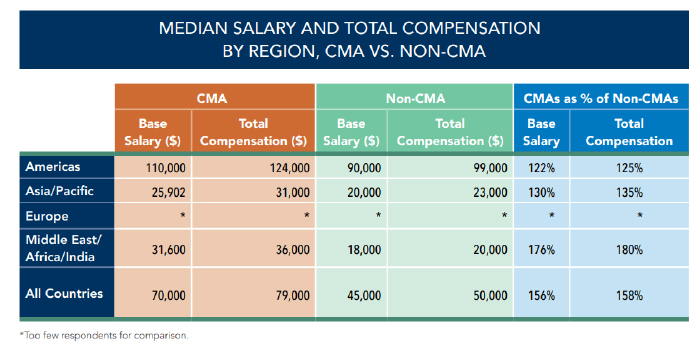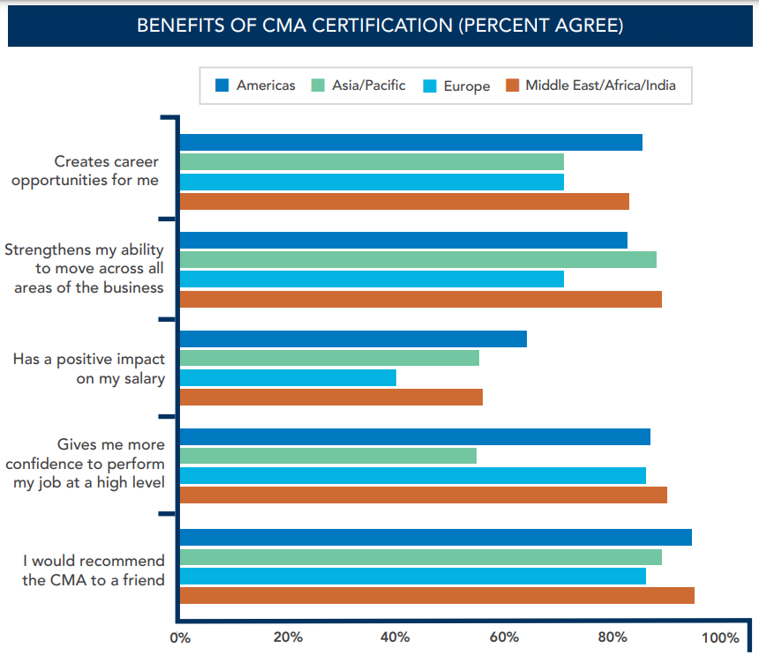Why Attending Preparatory Course
- Increases comprehension on materials
- Get hints and develop exam strategy cannot be found while working alone
- Imposes discipline and focus
- Compare and develop with other participants
- Assess your readiness
- Networking
- At the end, INCREASE YOUR PASSING PROBABILITY
COURSE SCHEDULE
| Part 1 & 2 Batch 2 | Weekdays Class |
| Training schedule | 23 July – 12 September 2024 |
| Day | Tuesday & Thursday |
| Time | 18.30 – 21.35 WIB |
| Venue | Online Class with Zoom |
COURSE FEE
NOTE :
REGISTRATION
Click here for registration. |
||||
Why take the certification program?
Certified Management Accountants (CMA-US) certification is a globally recognized professional certification in management accounting.
Obtaining a CMA certification can offer several benefits for accountants looking to advance their careers, including:
- Demonstrating Competence: CMA accreditation shows managerial accounting expertise.
- Improved Career Prospects: Better Job Prospects: CMA accreditation opens paths to higher-level accounting, finance, and similar roles.
- Enhanced Salary Potential: CMAs make more than non-certified CPAs. CMA accreditation shows management accounting expertise that companies value.
- Access to a Professional Network: CMA accreditation gives you entry to a global network of qualified professionals for job growth, knowledge-sharing, and professional advancement.
- Continual Professional Development: CMAs must continue their education and training to stay current in management accounting.
In summary, obtaining a CMA certification can be a valuable investment for accountants seeking to advance their careers, enhance their salary potential, and stay competitive in an increasingly complex and dynamic business environment.
Why CMA ?
Source: Global Salaries – Management Accountant Survey
(https://www.imanet.org/en/IMA-certifications/CMA-certification)

Conclusions:
IMA’s latest survey findings show that there are clear earnings-specific advantages for CMAs.
Source: Global Salaries – Management Accountant Survey
(https://www.imanet.org/career-resources/salary-information?psso=true)

Source: Global Salaries – Management Accountant Survey
(https://www.imanet.org/career-resources/salary-information?psso=true)
What is required to earn CMA certification?
- Active membership in IMA (Institute of Management Accountants)
- A bachelor’s degree from an accredited college/university or a related professional certification
- Complete two continuous years of professional experience in management accounting or financial management. This requirement may be completed prior to or within seven years of passing the examination.
- Passing Parts 1 and 2 of the CMA exam.
CMA Curriculum
The CMA: Two Exam Parts Covering 12 Competencies
The U.S. CMA certification says you’ve stepped up and mastered the 12 most critical practice areas of management accounting. The routine tasks of accounting will become a thing of the past. And new strategic challenges will become a thing of the present.
- Planning & Analysis
- Risk Management & Internal Controls
- Performance Management
- Technology & Analytics
| PART 1 | |
| Competencies | Percentages |
| External Financial Reporting Decision | 15% |
| Cost Management | 15% |
| Planning, Budgeting, and Forecasting | 20% |
| Performance Management | 20% |
| Internal Controls | 15% |
| Technology and Analytics | 15% |
| Total | 100% |
| PART 2 | |
| Competencies | Percentages |
| Financial Statement Analysis | 20% |
| Corporate Finance | 20% |
| Decision Analysis | 25% |
| Enterprise Risk Management | 10% |
| Investment Decisions | 10% |
| Professional Ethics | 15% |
| Total | 100% |
Exam Modules
- Candidate will have three hours to complete the multiple-choice section and one hour to complete the essays for each part.
- Part 1: 4 hours – 100 multiple-choice questions and two 30-minute essays.
- Part 2: 4 hours – 100 multiple-choice questions and two 30-minute essays.
- Candidate must answer at least 50% of the multiple-choice questions correctly to be eligible to take the essay section.
- Candidate will not receive immediate pass/fail results because the essay questions will be graded off-line.
Parts 1 and 2 are offered during the following three testing windows:
- January/February
- May/June
- September/October
(Historical) Passing Rates
| Exam Part | 2013 | 2014 | 2015 | 2015-2016 | 2016-2017 | 2018-2019 | 2020-later |
| Part 1 | 35% | 35% | 36% | 35% | 40% | 35% | 50% |
| Part 2 | 42% | 49% | 55% | 52% | 50% | 50% | 50% |
- The Part 1 pass rates are usually lower than the Part 2 rates.
- CMA Part 1 pass rates were 35% until 2017-2018. The 2017-2018 test-takers did better, with 40% passing CMA Part 1. Candidates may have been better prepared, which could explain the rise. In 2018–2019, Part 1 pass rates dropped again. After 2020, 36.25% of Part 1 test takers passed. Now that CMA pass rates are around 50%, applicants appear better equipped on exam day.
- 2013 had the lowest CMA Part 2 pass rate at 42%. By 2015, half of applicants passed Part 2. It’s not likely that the CMA exam got easier. Candidates studied smarter and harder. Even with 2020’s changes, Part 2’s pass rate has remained around 50%.


